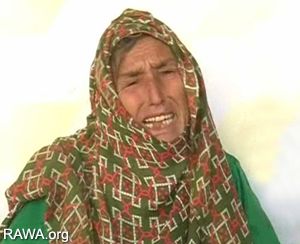Ms. Magazine, January 16, 2007
Drought-Stricken Villagers Resort to Selling Child-Brides
"There is widespread poverty. We have to sell off our children to survive. We are not proud of it, but we have to do it."
A second drought in Afghanistan has affected over two-and-a-half million villagers, some of whom are selling their young daughters as brides in order to feed and clothe their families. An article in The Guardian earlier this month documented the recent surge of bride-selling in Afghanistan that has resulted from two disastrous droughts to hit Afghanistan in the past three years. The Guardian reports that more than 80 percent of Afghans depend on agriculture, and the droughts resulted in some farmers losing between 80 and 100 percent of their crops. Additionally, areas affected by the drought experienced higher rates of malnutrition, infant mortality, and difficulty accessing water and firewood. Abdul Zahir, the head of the men's council in Houscha, said of the selling of girl children, "There is widespread poverty. We have to sell off our children to survive. We are not proud of it, but we have to do it."

Gulsha, the suffering mother of Sanobar, 11-years-old girl who is abducted and raped by warlords in north of Afghanistan
more... ( http://www.rawa.org/gulsha.htm )
According to Refugees International, an organization that provides humanitarian aid and assistance for displaced persons, about five percent of households in Afghanistan rely on selling the girl children as the main source of income. "I need to sell my daughters because of the drought," one mother, Sahatgul, 30, told The Guardian. "We don't have enough food and the bride price will enable us to buy food... We were not so desperate before. Now I have to marry [my daughters] younger." Additionally, families in need of money and food are accepting lower bride prices for their daughters; Refugees International reports that the price has decreased from $1,800 or 100 goats or sheep to less than $300 or 20 goats or sheep.
A separate article in The Independent points out that the criminalization of growing poppies also may have contributed to the increase of child-bride sales. Opium cultivation dropped 96 percent in the past year under a British-led eradication program, and farmers are having difficulties paying back loans to drug traffickers, according to The Independent.
Media Resources: The Guardian 1/7/07; The Independent 1/16/07; Refugees International
Characters Count: 2624
